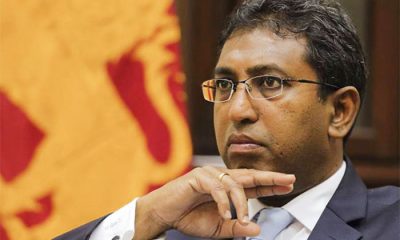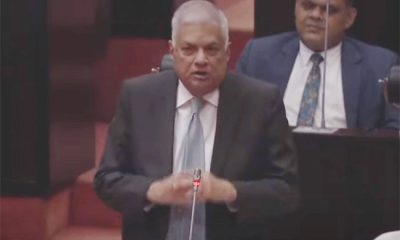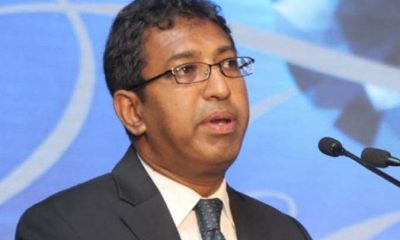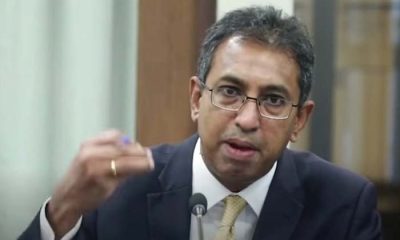News
Lanka needs to switch from investing in non-tradable to tradable goods fast: MP
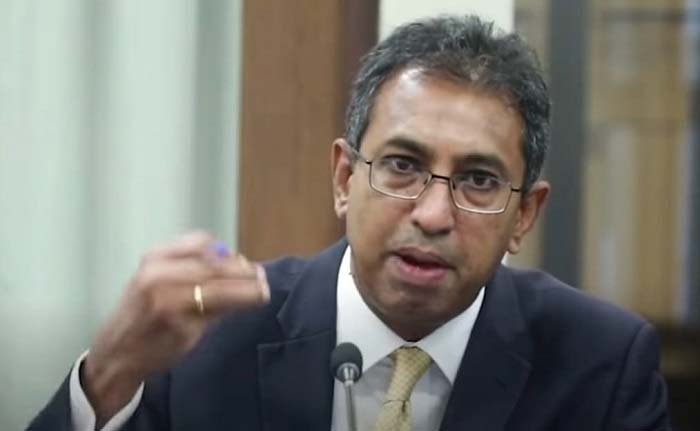
By NETHMI RAJAWASAM
ECONOMYNEXT –Sri Lanka continues to lag behind in its integration into global production networks due to short-sighted goals of producing non-tradables over tradable goods that can be exported, oppositional legislator Harsha De Silva has said.
“There has been a significant growth in the non-tradable sector and production of non-tradable goods between 2010 and 2019. From the growth in the total economy’s production, 70 percent was from the non-tradables sector which cannot be traded in the international market,” the opposition MP said during a debate in Parliament recently.
Non-tradable goods include items such as public services, real estate and construction, goods with very high transportation costs, and commodities produced specifically to meet local retail consumers.
The MP said that due to shortsighted large infrastructure investments such as the development that has gone into the Hambantota area, Sri Lanka’s production has shown exponential growth in the non-tradables sector.
About 50 percent of the foreign direct investments that came into the country in 2000-2020 were directed towards the non-tradables sector, while only around 25 percent went into the export-oriented market, former Chairman of the Board of Investment Thilan Wijesinghe said at a forum organised by Advocata Institute recently.
“This way the non-tradable sector that was developed with the massive foreign loans was proven to produce short term development that was unsustainable in the long run,” Wijesinghe said.
“In 2010 economic growth was recorded at 8 percent, in 2011 it was 8.4 percent and in 2012, 9.1 percent, but in 2013 it was recorded that it was 3.4 percent,” De Silva said, following a trend that denotes that growth has since been declining, due to the unsustainability of the concentration of investment in the non-tradables sector.
De Silva said North East Asian countries that employed sustainable practices have successfully integrated themselves into global trade networks.
“Our outlook on production should speedily switch to tradable goods or else face the consequences of being unable to match exports with imports,” he said.
The legislator pointed out that the reason behind the popularity of such short term goals in Sri Lanka have been the opportunistic nature of leaders.
“Since the political aim of achieving short term growth in the non-tradable sector had been achieved in the past, essential trade and investment reforms had been neglected. As a result of this, Sri Lanka’s growth was significantly stifled and slowed, in relation to its equals in the region,” he said.
News
US sports envoys to Lanka to champion youth development

The U.S. Embassy in Colombo welcomed the U.S. Sports Envoys to Sri Lanka, former National Basketball Association (NBA) and Women’s National Basketball Association (WNBA) players Stephen Howard and Astou Ndiaye, from June 8 through 14.
The Public Diplomacy section of the U.S. Embassy said that it would launch a weeklong basketball program intended to harness the unifying power of sports, made possible through collaboration with Foundation of Goodness and IImpact Hoop Lab.
While in Sri Lanka, Howard and Ndiaye, both retired professional basketball players, will conduct a weeklong program, Hoops for Hope: Bridging Borders through Basketball. The Sports Envoys will lead basketball clinics and exhibition matches and engage in leadership sessions in Colombo and Southern Province for youth aged 14-18 from Northern, Uva, Eastern and Western Provinces, offering skills and leadership training both on and off the court. The U.S. Envoys will also share their expertise with the Sri Lanka Basketball Federation, national coaches, and players, furthering the development of basketball in the country. Beyond the clinics, they will collaborate with Sri Lankan schoolchildren to take part in a community service project in the Colombo area.
“We are so proud to welcome Stephen and Astou as our Sports Envoys to Sri Lanka, to build on the strong people-to-people connections between the United States and Sri Lanka,” said U.S. Ambassador Julie Chung. “The lessons that will be shared by our Sports Envoys – communication, teamwork, resilience, inclusion, and conflict resolution – are essential for leadership development, community building, equality, and peace. The U.S. Sports Envoy program is a testament to our belief that sports can be a powerful tool in promoting peace and unity.”
News
Rahuman questions sudden cancellation of leave of CEB employees

SJB Colombo District MP Mujibur Rahuman in parliament demanded to know from the government the reasons for CEB suspending the leave of all its employees until further notice from Thursday.
MP Rahuman said that the CEB has got an acting General Manager anew and the latter yesterday morning issued a circular suspending leave of all CEB employees with immediate effect until further notice.
“We demand that Minister Kanchana Wijesekera should explain this to the House. This circular was issued while this debate on the new Electricity Amendment Bill was pending. There are many who oppose this Bill. The Minister must tell parliament the reason for the urge to cancel the leave of CEB employees,” the MP said.However, Speaker Mahinda Yapa Abeywardena prevented Minister Wijesekera responding to the query and said that the matter raised by MP Rahuman was not relevant.
News
CIPM successfully concludes 8th Annual Symposium

The Chartered Institute of Personnel Management (CIPM) successfully concluded the 8th Annual CIPM Symposium, which took place on 31st May 2024. Themed “Nurturing the Human Element—Redefining HRM in a Rapidly Changing World,” the symposium underscored the pivotal role of human resource management (HRM) in today’s dynamic global landscape. Since its inception in 1959, CIPM has been dedicated to advancing the HR profession through education, professional development, and advocacy, solidifying its position as Sri Lanka’s leading professional body for HRM.
Ken Vijayakumar, the President of the CIPM, graced the occasion as the chief guest. The symposium commenced with the welcome address by the Chairperson, Prof. Arosha Adikaram, followed by the Web Launch of the Symposium Proceedings and Abstract Book by the CIPM President. The event featured distinguished addresses, including a speech by Chief Guest Ken Vijayakumar, President of CIPM, and an address by Guest of Honor Shakthi Ranatunga, Chief Operating Officer of MAS Holdings Pvt. Ltd., Sri Lanka.
The symposium also featured an inspiring keynote address by Prof. Mario Fernando, Professor of Management and Director of the Centre for Cross Cultural Management (CCCM) at the University of Wollongong, Australia.
Vote of Thanks of the inauguration session was delivered by Dr. Dillanjani Weeratunga, Symposium Co-chair.
The symposium served as a comprehensive platform for researchers to present their findings across a wide range of critical topics in HRM. These included Cultural Diversity and Inclusion, Talent Development and Retention, Ethical Leadership and Corporate Social Responsibility, Adapting to Technological Advancements, Mental Health and Well-being at Work, Global Workforce Challenges, Employee Empowerment, and Reskilling and Upskilling.
The plenary session was led by Prof. Wasantha Rajapakse. Certificates were awarded to the best paper presenters during the valedictory session, followed by a vote of thanks delivered by Kamani Perera, Manager of Research and Development.
The annual symposium of CIPM was a truly inclusive event, attracting a diverse audience that spanned undergraduates, graduates, working professionals, research scholars and lecturers. This widespread interest highlights the symposium’s significance in the field of HRM, offering a unique opportunity for everyone to network and learn from scholarly brains.The CIPM International Research Symposium was sponsored by Hambantota International Port, Sri Lanka Institute of Information Technology (SLIIT), E B Creasy & Co. PLC, and Print Xcel Company.


